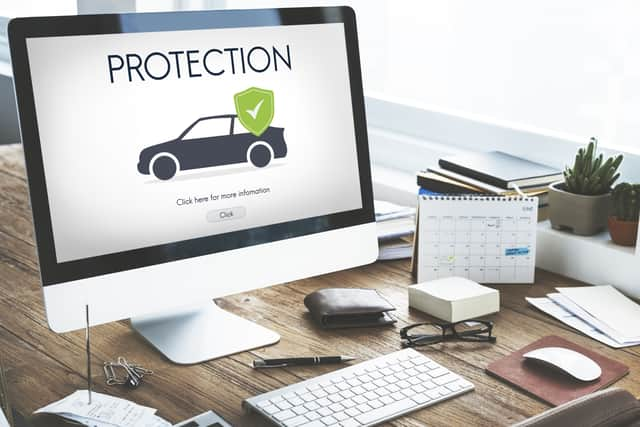Ghost broking car insurance scam: how to spot the signs of fake insurance deals and how to report them


Motorists are being urged to be on the lookout for bogus online car insurance deals that could leave them hundreds of pounds out of pocket.
As drivers look to save money in the face of the cost of living crisis they are being warned not to fall victim to scammers deliberately targeting those who can least afford to lose money.
Advertisement
Hide AdAdvertisement
Hide AdNew figures from the Insurance Fraud Bureau show the number of so-called “ghost broking” cases has doubled in the last 12 months and experts fear more drivers, particularly younger motorists, could end up out of pocket, uninsured and even facing criminal charges as a result.
Ghost brokers operate by offering to provide car insurance at far lower prices than traditional insurers or brokers. They advertise on social media channels such as Facebook and Instagram and often target young and inexperienced drivers and other groups who face higher insurance costs.


After taking payment for a policy they either provide fake or doctored insurance documents or take out a policy to obtain legitimate documents before immediately cancelling it and claiming the refunded costs.
In all cases, the victim is left believing they have insurance when they are actually uninsured. Driving without valid insurance is against the law and offenders face a £300 fine, six penalty points on their licence and risk having their vehicle seized.
Advertisement
Hide AdAdvertisement
Hide AdIn the last 12 months, the IFB has identified more than 55,000 fraudulent motor insurance applications - up from 21,000 in the previous year.
Ursula Jallow, director at the IFB, said: “Ghost broking scams are rife on social media and the impact is far reaching. Not only do ghost brokers leave victims penniless, without a vehicle and at risk of criminal charges, but these fraudsters are a cyber threat and cost the economy millions.”
David Phillips, chair at the General Insurance Fraud Committee (GIFC), added: “We know that fraud increases in times of hardship and that impenitent criminals will be looking to prey upon innocent cash-strapped motorists.
“Insurance fraud is a socially corrosive crime and those that create illegal and bogus policies leave young people, often some of the most vulnerable of society, without cover and without a safety net against the far-reaching consequences of driving without a legal policy in place.”
Advertisement
Hide AdAdvertisement
Hide AdA recent YouGov poll found just 17% of people were aware of ghost broking scams and how they work, prompting the IDF and General Insurance Fraud Committee along with City of London Police’s Insurance Fraud Enforcement Department to share advice for young drivers on how to spot and avoid a scam.
How to spot a ghost broking scam
Know the signs
- The price is much better than you can find anywhere else.
- The seller only wants to communicate via social media or a messaging app (eg WhatsApp or Snapchat).
- The seller is vague about how they’re getting you such a good price.
- The seller doesn’t have a legitimate website, UK landline number or address.
Do your checks
- If buying through a broker, check they’re registered with British Insurance Brokers’ Association (BIBA). Check here...
- If buying directly through an insurer, check they’re a member of Motor Insurers’ Bureau (MIB). Check here...
- Whether broker or insurer, check they’re registered with the Financial Conduct Authority (FCA). If they’re not, avoid using them. Check here...
Know the consequences
- There is a £300 fixed penalty notice.
- You may get six points on your driving licence.
- Your car may be seized and crushed.
- You face the cost of retrieving your impounded vehicle... if it hasn’t been crushed.
- You face the cost of buying a new, valid insurance policy.
- There may be court action resulting in a criminal record, an unlimited fine and a driving ban.
- You may be personally liable for your own and any third-party claims costs.
Ursula Jallow added: “In these hard economic times it’s crucial for drivers to spot the signs of host Broking scams, which is why we’re proud to be launching this campaign in partnership with GIFC and IFED. We urge anyone with evidence of an insurance scam to report it to us straight away.”
Comment Guidelines
National World encourages reader discussion on our stories. User feedback, insights and back-and-forth exchanges add a rich layer of context to reporting. Please review our Community Guidelines before commenting.
